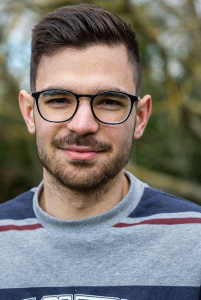I applied for roles at various pharmaceutical companies while in my second year and landed a 12-month Biostatistician placement with a contract research organization (CRO) called Parexel.
At a time when most companies had moved to remote working models for placement students, I was pleased that Parexel made the Sheffield office available full-time, 5 days a week. I was able to get to know other students who were on placement with Parexel (there were 11 of us in my year) as well as permanent staff from whom I received lots of face-to-face support. I also benefited from having not one, but two mentors (an experienced statistician and an experienced programmer) who have supported me from day one.
Throughout my placement, I worked on a wide variety of tasks across multiple projects. I didn’t feel like an intern at all and had the chance to program everything from simple data displays to more complex statistical models, like negative binomial regression and mixed models. I also wrote a statistical analysis plan, developed TLF shells (a set of templates of statistical outputs for a study), delivered a presentation to the entire UK biostatistics department, and liaised with external clients over statistical issues. This is all experience that will be invaluable should I return to the pharmaceutical industry after university.
A particular highlight of my year was the progress I’ve been able to make in statistical programming. Programming with a purpose in mind, coupled with some tough challenges, motivated me to improve. My skills have progressed far beyond what I’ve been able to pick up at university, and I am now proficient in both SAS and R (widely used statistical programming languages). Importantly, I now also have the confidence to tackle complex programming problems, which will be immensely helpful in the final year of my degree and beyond. I highly recommend a placement year if you enjoy programming or if your chosen career path is programming-heavy; applying your knowledge in a work environment will really help you build both confidence and competence.
During my placement, I’ve also discovered how varied the role of a statistician is. Aside from the more obvious statistical aspects of the work, statisticians also lead teams, liaise with clients, write complex documents, and plan long-term deliverables for clients. There are various pathways within statistics, too; there are management and client-oriented roles as well as more academic ones. While on placement, I had the chance to talk to statisticians at both ends of the spectrum, which gave me a better idea of the kind of role that would suit me best.
In conclusion, if you are unsure about taking a placement year, I encourage you to go for it. Aside from the obvious in gaining invaluable experience in my chosen field, my placement has helped me grow as a person. I now feel much more confident in being able to overcome challenges, grow in my abilities and bring something positive to a company. Importantly, I also now know that I have what it takes to become a good medical statistician and make a real difference to patients when I return to the industry after university.


